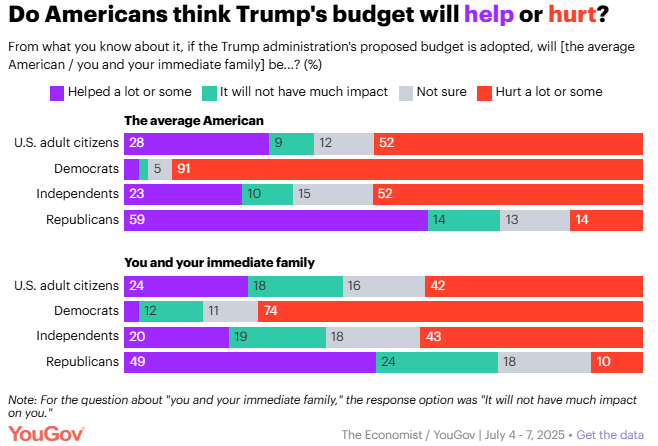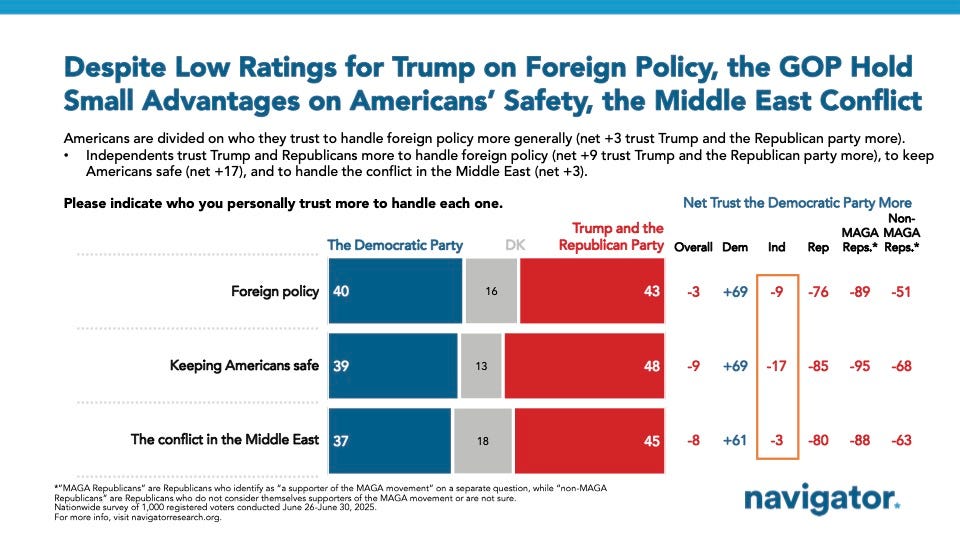Donald Trump's budget, health care, tariffs, and abortion: July 4 - 7, 2025, Economist/YouGov Poll Taylor Orth and David Montgomery, YouGov This week’s Economist/YouGov poll covers… • The unpopularity of Trump's budget and the popularity of "Medicare for all" • Negativity toward U.S. health care • Uncertainty about the status of Trump's tariffs • Stability in abortion opinion
People in Many Countries Consider the U.S. an Important Ally; Others See It as a Top Threat Janell Fetterolf, Laura Clancy and Jordan Lippert, Pew Research Center Europeans often name Russia as a top threat, while those in the Asia-Pacific tend to name China
Climate Change in the American Mind: Beliefs & Attitudes, Spring 2025 Yale Program on Climate Change Communication and the George Mason University Center for Climate Change Communication • Americans who think global warming is happening outnumber those who think it is not by a ratio of more than 4 to 1 (69% versus 15%). • 60% of Americans understand that global warming is mostly human-caused. By contrast, 28% think it is caused mostly by natural changes in the environment. • 64% of Americans think global warming is affecting weather in the United States, including 34% who think weather is being affected “a lot.” • Majorities of Americans say they are worried their local area might be harmed by extreme weather events or related impacts.
Few concerned with declining birthrates, but many worry about the costs of child care and favor paid family leave AP-NORC Center for Public Affairs Research About half of the public think child care costs and improving health outcomes for pregnant women should be high priorities for the federal government, just 12% think encouraging families to have more children should be a top priority.
US adults want the government to focus on child care costs, not birth rates, AP-NORC poll finds Tiffany Stanley and Linley Sanders, Associated Press While the Trump administration explores ways to encourage Americans to have more babies and reverse the United States’ falling birth rate, a new poll finds that relatively few U.S. adults see this as a priority or share the White House’s concerns. Instead, Americans are more likely to want the government to focus on the high cost of child care and improving health outcomes for pregnant women, according to the survey from The Associated Press-NORC Center for Public Affairs Research. Short-Term Inflation Expectations Tick Down, Household Financial Expectations Improve Federal Reserve Bank of New York The Federal Reserve Bank of New York’s Center for Microeconomic Data released the June 2025 Survey of Consumer Expectations, which shows that households’ inflation expectations ticked down at the short-term horizon and remained unchanged at the medium- and longer-term horizons. Unemployment and job loss expectations improved. Spending growth expectations slightly declined, while household income growth expectations increased. How Americans think a president impacts the country and their personal lives Gabriel Borelli and Rolando Ortega, Pew Research Center Americans widely say that who the president is has a large impact on the country overall but a more limited impact on their own personal lives, according to a new Pew Research Center survey.
Voters Do Not Support Trump’s “Denaturalization” Threats Data for Progress New Data for Progress polling finds that voters generally do not support the denaturalization or deportation of U.S. citizens, even in the instance of serious crimes.
Share this free issue of Opinion Today:
Trump’s Foreign Policy Reveals Deep Divisions Among Americans Zoya Qadiri, Navigator Research This Navigator Research report covers the latest perceptions of Trump and Republicans’ recent foreign policy moves, including levels of support for U.S. military involvement in Iran.
Everyone is worried about natural disasters. Most don’t think one will happen to them. Natalie Jackson, National Journal [unlocked] Catastrophic flooding in Texas triggers debate about warnings, but will anything change? Congress Is Addicted to Megabills — Despite Their Risks Ronald Brownstein, Bloomberg Opinion Both parties have forgotten, or rejected, the advice of Thomas Jefferson, who wrote in 1808 “that great innovations should not be forced on a slender majority. Why voters probably won’t punish Republicans for cutting Medicaid Perry Bacon Jr., Washington Post Americans really like Medicaid. But they don’t seem to vote based on who supports it or doesn’t. Three big takeaways from that “One Big Beautiful Bill” Sarah Binder (George Washington University), Good Authority Republican tactics seem likely to weaken the Senate – and make fiscal crisis more likely. The “Big Beautiful Bill” May Carry Big Political Peril Michael Baharaeen, The Liberal Patriot President Trump has described the law, which includes a host of provisions related to tax policy, Medicaid, immigration, and more, as “very popular.” Early signals, however, indicate that the president has a long way to go in persuading Americans that the law is good for the country overall—and for them, specifically. How to Make Senate Republicans Pay for Their Awful Bill Michelle Goldberg, New York Times As Dan Osborn begins a new Senate campaign, he thinks some Republicans have buyer’s remorse. Trump can’t achieve his economic goals without more immigrants Stephen Moore and Richard Vedder (Unleash Prosperity), Washington Post [unlocked] Without immigration, the U.S. workforce would soon start shrinking. Why Do So Many People Think That Trump Is Good? David Brooks, The Atlantic [unlocked] The work of the moral philosopher Alasdair MacIntyre helps illuminate some central questions of our time. Musk Goes Third Party Jonathan Bernstein, Good Politics/Bad Politics He's the latest to take up the futile and pointless challenge. Why a Third-Party Bid Is Unlikely but Not Impossible Nate Cohn, New York Times [unlocked] Answering reader questions about the obstacles and opportunities for new parties like the one formed by Elon Musk. Musk's America Party Signals the Collapse of Philosophical Politics The Great Transformation with Mike Madrid Elon Musk's announcement of the "America Party" doesn't herald the dawn of meaningful multiparty democracy; it marks the final death of American political philosophy and the rise of pure tribal warfare between competing personalities. Why is Elon Musk starting the America Party? What social science tells us about why billionaires run for office LSE USAPP Following a well-publicized split with President Trump, tech billionaire Elon Musk has announced that he is launching a new political party. Nikhil Kalyanpur writes that there is nothing new about businesspeople going into politics: elected office can increase their businesses’ value and profits. What is new is that billionaires like Musk are now more likely to enter politics in autocratic settings, which America is increasingly resembling. Elon Musk says he’ll start a new political party. He’s not the first. Annabelle Timsit, Washington Post Musk said he wants to form the America Party. A third party has never won the presidency, but they have influenced elections, experts say — mostly as spoilers. Elon Musk’s Grok Is Calling for a New Holocaust Charlie Warzel and Matteo Wong, The Atlantic [unlocked] The chatbot is also praising Hitler and attacking users with Jewish-sounding names. The Republican Strategy to Win Without Trump on the Ballot Lindsay Wise, Wall Street Journal [unlocked] GOP group’s new strategy tries to rally ‘prosperity’ voters to keep House in 2026 Virginia politicians look outside the state for political punching bags Gregory S. Schneider, Washington Post Republicans running statewide in Virginia this year have started using New York City Democrat Zohran Mamdani as a bogeyman, while Democrats point to Washington. Never Zohran is looking a lot like Never Trump Patrick Ruffini, The Intersection Why New York City is probably screwed Laura Loomer, Trump’s Blunt Instrument Ken Bensinger and Robert Draper, New York Times [unlocked] The right-wing provocateur and Islamophobe has few friends in the West Wing but a big fan in the Oval Office. Democrats Have ‘a Massive Blind Spot When It Comes to Male Issues’ Thomas B. Edsall, New York Times [unlocked] Much of the analysis of the 2024 election focused on Democratic losses among working-class minorities, especially Hispanic and Black voters. But the dominant theme of the contest was, in fact, the broader shift of men of all races and ethnicities to the Republican Party. How to Know When the Frog Has Boiled Damon Linker (University of Pennsylvania), Persuasion Autocracy in America won’t unfold the way you expect. Democracy isn’t dying in darkness. It’s being killed off in plain sight. Jodie Ginsberg (Committee to Protect Journalists), Philadelphia Inquirer [unlocked] Citizens’ ability to push back against authoritarian measures is being stifled by a calculated assault on the press and a capitulation to that assault by media owners.
If you haven’t already done so, become a paid subscriber and receive the FULL Opinion Today briefing first thing each morning, Monday-Friday, plus an expanded edition on weekends.
PLAYLIST
How the Attention Economy Is Devouring Gen Z — and the Rest of Us The Ezra Klein Show Donald Trump and Zohran Mamdani are both proof of how the ability to capture attention is power. And the attention economy isn’t reshaping just politics; it’s also reshaping the actual economy: the crypto market, A.I. venture capital, and how people, especially Gen Z, are making career decisions. Kyla Scanlon has emerged as a leading theorist on the economics of attention and is herself a member of Gen Z. She is the author of the book “In This Economy?” and Kyla’s Newsletter on Substack. I asked her on the show to walk us through her theory of the attention economy.
How Trump's media war came for CBS Post Reports Donald Trump has spent the past decade waging war on the media. That has included filing frequent lawsuits against media organizations whose coverage he views as unfavorable. Those lawsuits have been largely unsuccessful, until recently. Last week, Paramount announced it was settling a lawsuit brought by Trump against CBS News over the news program “60 Minutes.” Although many legal experts believed the case was unlikely to succeed at trial, Paramount chose to settle for $16 million. Elahe Izadi talks to reporter Sarah Ellison about the origins of the case, why Paramount would choose to settle, and what implications the settlement has for the wider media landscape.
'Like tariffs in theory, hate 'em in practice': Enten on American voters' opinions CNN CNN chief data analyst Harry Enten breaks down public opinion on tariffs, and how they've dragged down President Trump's overall approval ratings.









